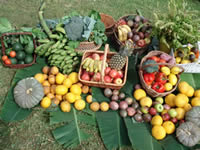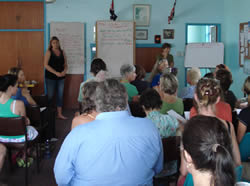Mullumbimby Action Group -> community -> wooliesmeeting
Local Action Challenges Global Economy
The destructive global economy can only exist as long as we are prepared to accept and subsidise it. We can reject it. We can start today by joining the local food movement and reap the wealth of benefits from re-linking farmers and consumers. Fresh, local food for all may be one of the most rewarding - and certainly the most delicious results of localisation.
On Saturday 2nd of February the Mullumbimby Community Action Group held a public meeting at the Pioneer Hall, to discuss the effects of Woolworths opening up a supermarket in the town. Over 100 people attended,filling the hall to overflowing.
The meeting was opened by Athol Compton a local Midjungbal/Bundjalung elder.
Deborah Lilly posed the question "What happens when a multinational juggernaut comes to a small country town like Mullumbimby?. This meeting is to find out the answer."
The meeting was chaired by Anthea Amore, who opened the meeting by saying,
"Many of us see this as a great opportunity to bring the community together and to talk about the future and the direction of our town, Mullumbimby and its surrounds. We and the community have the right and the power to determine our town's future. This is also a great opportunity to share information about where our food comes from, and the hidden true costs of food production in the world today. Then we can strengthen our community and its spirit by affirming our right to determine the outcome of planning decisions that will shape and affect our community for generations to come."
Katrina Shields recently from Maleny, spoke about the effect of Woolworths moving into Maleny, a small country town similar to Mullumbimby in Queensland. Due to community process and action, Woolworths is often quite empty, while the main street is bustling with activity and the IGA does a roaring trade.
Strong Local Economy
 "We seriously need to strengthen our local food economy. This development(Mullum) is a step in the wrong direction and will weaken it. Some of the reasons are, Woolworth's are locked into central buying systems and it is very hard for them to stock many local products. They truck their produce a long distance which means food-miles, greenhouse gases, more highways, more trucks, and they lock their suppliers into restrictive contracts. This continues into demanding perfect looking produce, and a very uniform kind of produce, which often pushes growers into using more and more chemicals. This usually means food is less healthy. Their main purpose is to dominate the market and maximize profit for their shareholders, and that is done by sucking money out of the local economy into their own corporate system. They give very little returns to local communities. Compare this to local small businesses, which re-circulate money back in to the local economy. This has a multiplier effect, the more they buy from local suppliers, the more money goes around in the town. Local small businesses also put substantial amounts of money into local clubs and cultural activities which rely heavily on business donations.
"We seriously need to strengthen our local food economy. This development(Mullum) is a step in the wrong direction and will weaken it. Some of the reasons are, Woolworth's are locked into central buying systems and it is very hard for them to stock many local products. They truck their produce a long distance which means food-miles, greenhouse gases, more highways, more trucks, and they lock their suppliers into restrictive contracts. This continues into demanding perfect looking produce, and a very uniform kind of produce, which often pushes growers into using more and more chemicals. This usually means food is less healthy. Their main purpose is to dominate the market and maximize profit for their shareholders, and that is done by sucking money out of the local economy into their own corporate system. They give very little returns to local communities. Compare this to local small businesses, which re-circulate money back in to the local economy. This has a multiplier effect, the more they buy from local suppliers, the more money goes around in the town. Local small businesses also put substantial amounts of money into local clubs and cultural activities which rely heavily on business donations.
The Bigger Picture
Helena Norberg-Hodge said, "I have been working on these issues for the last 30 years. I first became aware of what is happening with food and farming when I ended up in a remote part of the world (Tibet actually) which had been closed off from the global economy, the corporate influences, and I saw what happened to that area when it was opened up to the so-called free market. The government was subsidizing roads, transport, petroleum, and the production of large monocultures. Then, suddenly, food came in literally from the other side of the world, and it was sold for a lower price than local producers needed to survive. I saw how this so called free market destroys local economies, local producers and local businesses. Food is the only thing that human beings produce that we need every single day."
 "What we have in place is called a free market, but it is in fact mega-merging monopolies. However they don't look like monopolies, because they are so global, so mobile, and they influence government policy. If you look at it from the big picture you might think it is hopeless because it is so big. However, I have found that now there is a rethinking. There is a growing localization movement. Presently, this movement is still relatively invisible, but it is quite large. You would be amazed at the number of farmers markets, and other initiatives that have started all round the world, in the US, UK, France, India, and Africa. People have realized that it is in all our interests to support our local economy.
"What we have in place is called a free market, but it is in fact mega-merging monopolies. However they don't look like monopolies, because they are so global, so mobile, and they influence government policy. If you look at it from the big picture you might think it is hopeless because it is so big. However, I have found that now there is a rethinking. There is a growing localization movement. Presently, this movement is still relatively invisible, but it is quite large. You would be amazed at the number of farmers markets, and other initiatives that have started all round the world, in the US, UK, France, India, and Africa. People have realized that it is in all our interests to support our local economy.
Transition Town
We can promote Mullumbimby as a TRANSITION TOWN. This is a new concept gaining ground in the UK, where there are 50 such towns. It means we are in transition from a high carbon footprint economy to a low carbon footprint economy.
The first the residents of Mullumbimby knew about Woolworth's was an article on the Echo front page Tues 1st january 2008. The announcement came after the period to make an appeal against the approval had expired.
Apologies were received from Byron Shire Mayor Jan Barham, and Ray Downey of the Byron Council planning department.
Links http://www.mullumaction.blogspot.com
| June 2025 | ||||||
|---|---|---|---|---|---|---|
| S | M | T | W | T | F | S |
| 1 | 2 | 3 | 4 | 5 | 6 | 7 |
| 8 | 9 | 10 | 11 | 12 | 13 | 14 |
| 15 | 16 | 17 | 18 | 19 | 20 | 21 |
| 22 | 23 | 24 | 25 | 26 | 27 | 28 |
| 29 | 30 | |||||
No events for today
Add your event here


